Well-known chemist Ellen Swallow Richards once said, “Home economics stands for the ideal home life for today, unhampered by the traditions of the past and the utilization of all the resources of modern science to improve home life.”
For those who aren’t quite sure what home economics (or home ec) is, dictionary.com defines it as simply “the art and science of home management.” Home economics teaches the basic standards of living in a house.
Now one can imagine how this would be relevant to young citizens of the world, who will most likely one day have to purchase a home and take care of themselves and whoever they may choose to support along with them. For these reasons, home economics was taught in schools in the United States. However, as of recent times, home ec has seen a major decrease in the USA.
Naples High is one of the schools that has stopped teaching the subject, and even though it has a home ec classroom, the school continues to go without the vital class. Why? There are so many benefits that come from the course.
“It teaches us fundamentals that aren’t taught through textbooks or at home,” freshman Hannah Finman said. “School would be a great time to learn the life skills needed for the future.”
Home ec has changed so much compared to what it used to be. The Smith-Lever Act of 1914 and the Smith-Hughes Act of 1917 first funded these classes to be intended specifically for women to learn how a household functions. Although this indulged in gender based stereotypes, it also opened up opportunities for women in engineering as they had to figure out how things in a house work. During the year 1970, the course became co-ed and both men and women had to participate. About 24 years later, it started being referred to as Family Consumer Sciences. This program is altered from the original home ec to fit the needs of a modern world instead of prejudices.
“I think it gives students life skills,” biology teacher Veronica Samuelson said. “So they get not only their academic knowledge, they get street knowledge.”
This Family and Consumer Sciences program will do a tremendous amount of good things for students at Naples High. Now that the old home economics class has been modified to provide knowledge to a modern society, students can focus on what they will need to know as an adult in this day and age.
“For me, the ages between 18 and 23 were the most difficult time of my life because I was going through the growing pains of learning to be an adult all on my own,” AP Human Geography teacher Kelly Romero-Bettridge said. “I think that students would not only benefit from such a course, but our school and our community could use it as an investment in our future.”
Times are tough right now. The pandemic caused a surplus of stress and anxiety on both parents and their children. Homes right now may not be in very good shape. With a Family Consumer Sciences class, students would be much more capable of helping out in their own households as well as being prepared for their future.
“Naples High should bring back home economics to teach students skills they may not have and are necessary to prepare themselves for college and after college,” freshman Olivia Madwar said.
It is estimated that around 73% of high school students in America use their cell phones at school each day. With a class like this, students would be engaged and active while learning something valuable that they can carry with them for the rest of their lives.







